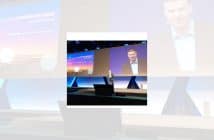All second level schools in Dublin, Meath and Kildare will have high speed (100Mbps) broadband installed during 2013, the Minister for Communications, Energy & Natural Resources, Pat Rabbitte T.D. and the Minister for Education and Skills, Ruairí Quinn T.D. announced today.
This is the second stage of a national roll-out to all second-level schools. The 2012 phase of the project saw broadband installed in all post-primary schools in 14 western and midlands counties, covering 202 schools. This built upon a pilot project involving 78 schools nationally, where the use of broadband has been shown to have improved both teaching and learning.
Today’s announcement details a further 216 schools to be connected in Dublin, Meath and Kildare by September 2013, with all remaining 250 schools to be connected in 2014.
Speaking at Presentation Secondary School in Warrenmount, Dublin, Minister Rabbitte said “I am very pleased that my Department is investing in industrial strength, future proofed connectivity for these schools. By bringing 100Mbps uncontended connectivity directly to the premises many students will now have vastly enhanced access to new and innovate educational tools. This is a completely different standard of connection to domestic broadband and will allow multiple applications to be accessed by students right across the school.
“This is an important investment in Ireland’s competitiveness. From now on these schools will mirror the workplaces of tomorrow. These students will therefore be much better prepared for the digital economy when they seek work.”
Commenting on the announcement, Minister Quinn said “This Government is committed to delivering on the commitment in the Programme for Government to incorporate the integration of ICT/ digital technology in teaching and learning across the curriculum, and to invest in broadband development to ensure schools have access to modern high-speed networks. The use of ICT/ digital technology will be one of the key skills in the new Junior Cycle, and it will be enhanced through the availability of a short course, currently being developed by the NCCA, that will deal with programming / coding for junior cycle students from September 2014. In order to facilitate students in developing ICT skills access to fast reliable broadband is essential.
The roll out of 100Mbps to all post primary schools will also facilitate schools to develop e-portfolios to augment the school-work component of the new Junior Cycle.”
Both Ministers were agreed that despite Ireland’s current economic difficulties, this significant investment in driving our schools forward into the digital age is money well spent. According to Minister Quinn, “the internet is providing learners with the possibility of learning at any time and in any place. Accessing education through mixed media delivers a richer educational experience. Applying technology in the right way can make education not just more engaging – but more appealing – so the students and teachers get more from it.”
Minister Rabbitte concluded by referencing the important job creation possibilities. “It is a key investment in future employment and employability as it feeds into the development of a more ICT literate workforce. The European Commission estimates that there will be up to 1 million unfilled vacancies in the ICT area within Europe, by 2015. At a conference in Brussels today, ‘Filling the gaps: e-Skills and Education for Digital Jobs’, policy makers, industry and education specialists are discussing this challenge.Clearly, ICT literacy at second level is an important element of the wider objective of addressing Europe’s ICT skills deficit”.
The Department of Communications, Energy and Natural Resources (DCENR) is funding all of the capital costs of this project, estimated to be approximately €11m, as well as contributing some €10m in current costs for the years 2012 to 2015. The Department of Education & Skills (DES) will fund the remaining current costs (estimated to be some €20m up to 2015). DES will also fund the on-going costs on an annual basis into the future.



